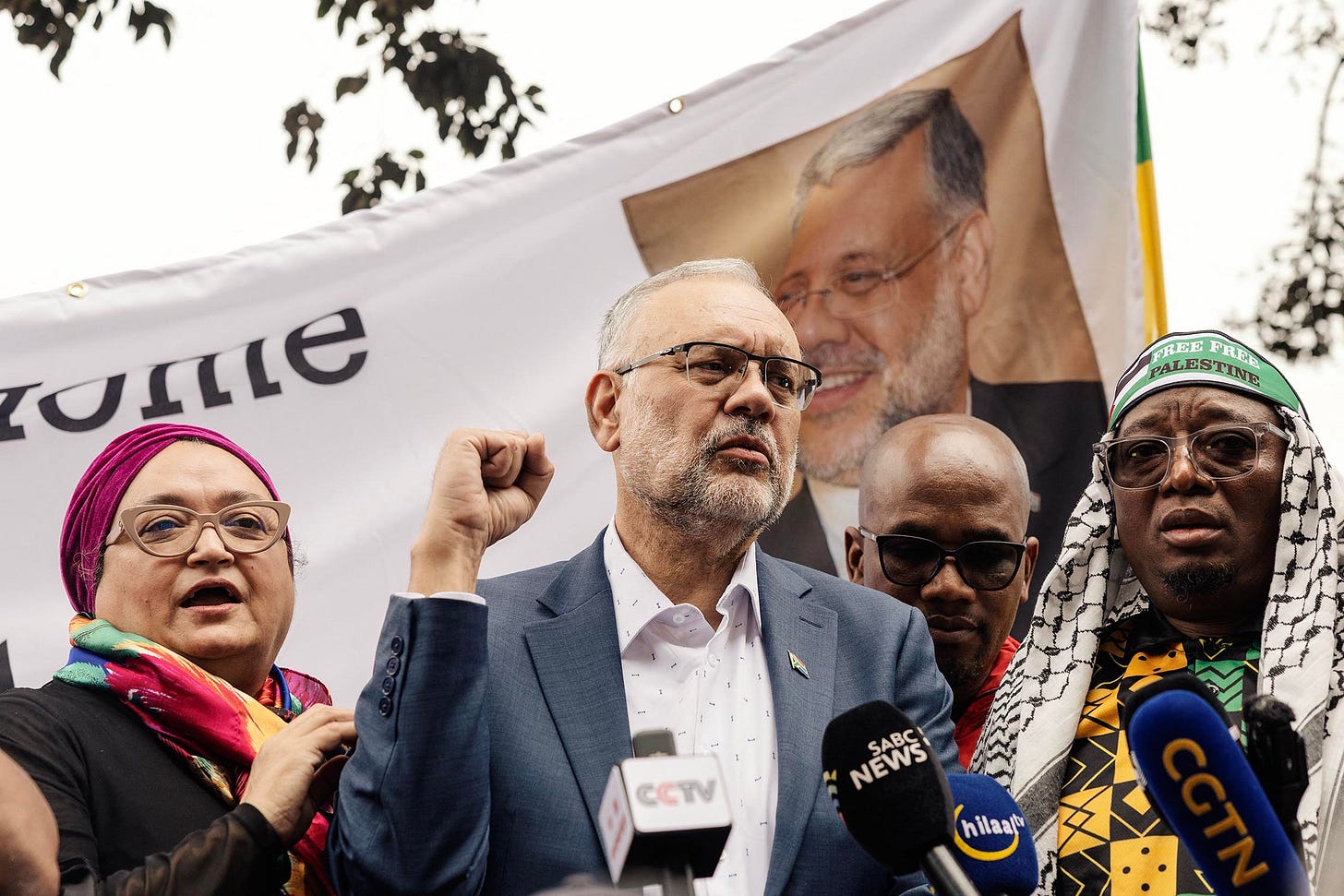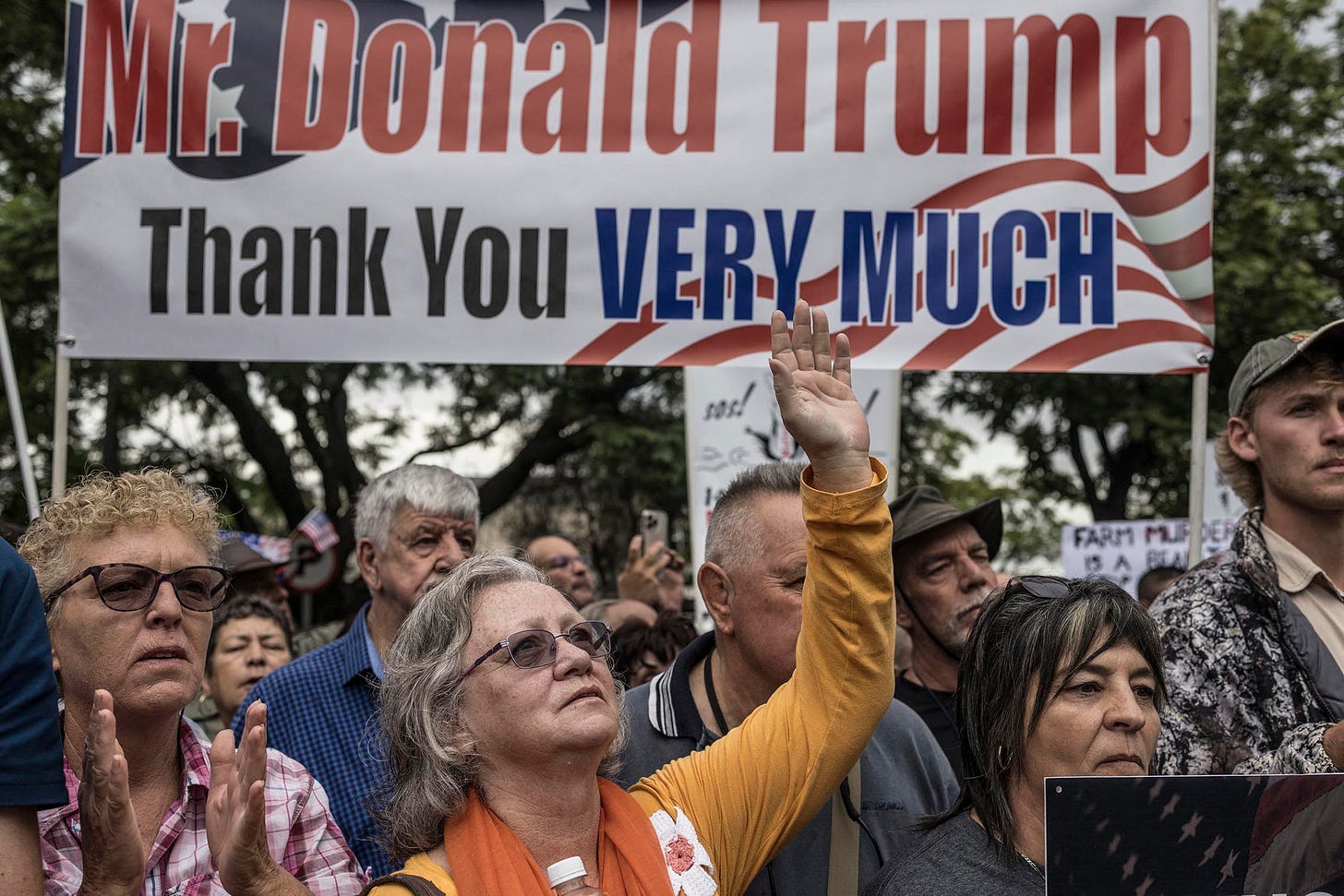Navigating the new world order
The United States is reframing South Africa as a pariah state. Pretoria has other ideas.
Notwithstanding the odd corruption scandal, and the country’s reputation for violent crime, South Africa’s leaders have spent most of the last three decades basking in international adulation. Nelson Mandela, the Truth and Reconciliation Commission, Desmond Tutu, multiracial democracy, Invictus: the story of the Rainbow Nation, and how it rose from the bitter ashes of history’s most sophisticated white supremacist state, is the model of what a peaceful political transition should look like.
South Africa is not used to being the bad guy. The aggressive rhetoric from senior American officials is reflected in equally aggressive policy.
And yet, in Donald Trump’s White House, that is the narrative being spun by the president and his closest allies – including South Africa-born billionaire Elon Musk, who is using the unprecedented power of his personal social media platform to amplify baseless conspiracy theories about a “white genocide”.
South Africa is too close to Iran, they claim. South Africa is supporting Hamas and undermining the state of Israel. South Africa is killing and otherwise persecuting its white minority, specifically its Afrikaner white minority – who, by the way, are welcome to seek asylum in the United States even as immigration agents are rounding up and deporting as many non-white immigrants as possible.
The aggressive rhetoric from senior American officials is reflected in equally aggressive policy. All aid to South Africa has been suspended by executive order. South Africa’s ambassador to the United States was expelled. And this week, as seen in a draft federal memo that was leaked to Bhekisisa, South Africa – like China – is being labelled a “country of concern” by the US State Department. That’s just one rung above countries like Iran and North Korea, who the US considers pariah states and excludes from international financial systems. If hostilities continue, could this be South Africa’s fate? And just how badly would it devastate Africa’s largest economy?
A different destination
These questions – unthinkable mere months ago – have thrown South Africa’s political and commercial classes into panic. How, exactly, should President Cyril Ramaphosa respond to a hostile, racist superpower?
In foreign policy circles, there are two broad schools of thought. The first is that the United States is too powerful and too important to South Africa’s economy to risk any further punitive measures, and can be appeased by rapidly changing foreign policy priorities.
“Ramaphosa may simply be overwhelmed or asleep at the wheel,” wrote the Brenthurst Foundation’s Greg Mills and Ray Hartley in a scathing commentary that laid all the blame for the current debacle on the president’s doorstep.
These policy changes would include cutting relations with Iran, and keeping China and Russia at arm’s length. Dropping the case at The Hague against Israel. Scrapping the Expropriation Act, even though – contrary to far-right hysteria – the new law simply brings South Africa in line with best practice in the rest of the world. Sending a white, conservative man to lead the embassy in Washington DC. Pledging fealty to Trump and the greatness of the America that he is making. And then maybe South African companies will retain preferential access to the American market, aid funding will resume, and sanctions will be avoided.
It is a big maybe. There is no guarantee that these kinds of concessions will change the tone of the engagement from the White House. And there is one concession, arguably the most important of them all, that South Africa simply cannot make: It cannot halt the “white genocide”, because no such thing exists, except in the imaginations of the white supremacists in Trump’s inner circle. And the racists really need to keep the “white genocide” story alive in order for their ideology to make any sense at all.
“The South African case is important because it plays a central role in global white supremacist claims,” wrote Nicky Falkof, a professor of the University of the Witwatersrand, in The Conversation. “These mythologies claim that white South Africans, specifically Afrikaners, are the canary in the coalmine: that the alleged oppression they are facing is a blueprint for what will happen to all white people if they don’t ‘fight back’.”
South Africa’s other option? Defiance.
On this, the country has recent form. South Africa’s case against Israel at the International Court of Justice – accusing Israel of committing genocide in Gaza – positioned it as one of the few countries in the world willing to take the fight to Israel and its western allies, despite the considerable diplomatic and economic risk.
“Trump’s attempts to bully us into withdrawing or muzzling ourselves must fail. Maintaining our solidarity is not simply about principles – it is also about our relationship to history,” wrote Sisonke Msimang, the writer and activist. “In these turbulent waters, we head for a different destination than the one America threatens.”
In this approach, South Africa would lean into its long-professed commitment to non-alignment and the promotion of human rights – notwithstanding its uneven application of these standards in places like Zimbabwe and Sudan – to make itself a kind of moral conscience for the Global South.
America’s recent shift towards authoritarianism and Europe’s struggles to contain far-right parties with similarly anti-democratic aspirations create room for a new leader of the “free world”.
Suddenly, it does not feel that farfetched to imagine a near future where South Africa – with its lauded constitution and vigourously independent judiciary – is among the leading voices when it comes to the protection of civil liberties and democratic space. (Editor’s note: It is no accident that The Continent is published from South Africa, which offers some of the world’s most comprehensive legal protections for independent journalism.)
Tellingly, this argument is not just coming from within South Africa. A version of it is also being made by Binaifer Nowrojee, the president of the Open Society Foundations. Open Society is one of the biggest funders of civil society around the world, and has had to rethink its approach to philanthropy and social change in the wake of Trump’s re-election. Nowrojee outlined some of its strategy in a set of three major speeches in Cape Town, Johannesburg and Pretoria earlier this month.
SA can’t halt “white genocide” because no such thing exists, except in the imaginations of white supremacists.
Doing so in South Africa was a deliberate choice, Nowrojee told The Continent, a conscious attempt to view the world from the perspective of South Africa and the Global South. And given the difficult diplomatic terrain South Africa f inds itself, it was also an act of solidarity.
“The world as we knew it in terms of power centres is shifting. We’ve gone from the Pax Americana to a multipolar world,” Nowrojee said. “It’s going to mean that the kind of bullying we’ve seen recently from the United States is going to diminish, as countries find alternative ways of trading and dealing with each other … There are great opportunities for Africa to engage.”
As risky as it is to defy the world’s pre-eminent superpower, South Africa’s leaders may not be left with much choice. This week, Trump announced the appointment of a new ambassador to Pretoria. It is unlikely to calm the troubled waters. As Peter Fabricius observed in the Daily Maverick: “South Africa’s already rocky relations with the US are likely to get rockier with President Donald Trump’s nomination this week of the conservative media critic and ardent pro-Israeli sympathiser Leo Brent Bozell III as his ambassador to South Africa.”
South Africa’s ruling party – Africa’s oldest political party – has already defeated one white supremacist state. Can it stand firm against another one?







Hats off, Simon Allison. This was brilliant. To sober heads anyway.
Great article! So true South Africa must not be bullied!